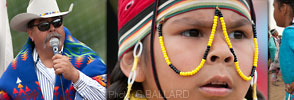 |
 |
 |
Publishing Corner: Indian Community: Science & Wonder Indian Heros: California Indian Art: CALIE Library: Academic Financial Aid: Tribal Governments: Indian Gaming: |
PAUMA TRIBAL MEMBERS BRING ALCOHOLICS SAFE HAVEN
Weekly AA meetings on reservation have grown nearly tenfold since inception Pauma Valley, Calif. (July 23, 2010) — Anyone who's ever attended an Alcoholics Anonymous (AA) meeting at Pauma Tribal Hall might be familiar with Pauma Tribal member and Administrative Receptionist Denise,* who started the meetings about two years ago with her husband, Frank,* after the two weathered their own drug and alcohol addictions. Through strength, compassion and determination, Denise and Frank have been making a small but important dent in one of the country's highest substance abuse rates. "I'm just giving back what I so freely received," said Denise, who recently returned from a Tribe-sponsored trip to the 2010 International Convention of Alcoholics Anonymous in San Antonio, Texas. "What's great is that we see Native people come in and we're able to help them, too."
|

